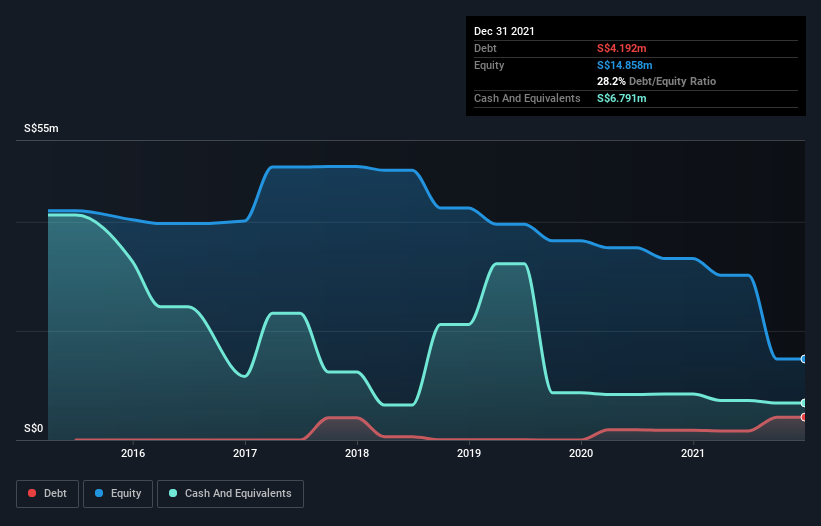Warren Buffett famously said, 'Volatility is far from synonymous with risk.' So it might be obvious that you need to consider debt, when you think about how risky any given stock is, because too much debt can sink a company. We can see that Pavillon Holdings Ltd. (SGX:596) does use debt in its business. But the real question is whether this debt is making the company risky.
What Risk Does Debt Bring?
Generally speaking, debt only becomes a real problem when a company can't easily pay it off, either by raising capital or with its own cash flow. If things get really bad, the lenders can take control of the business. However, a more usual (but still expensive) situation is where a company must dilute shareholders at a cheap share price simply to get debt under control. By replacing dilution, though, debt can be an extremely good tool for businesses that need capital to invest in growth at high rates of return. When we think about a company's use of debt, we first look at cash and debt together.
View our latest analysis for Pavillon Holdings
How Much Debt Does Pavillon Holdings Carry?
As you can see below, at the end of December 2021, Pavillon Holdings had S$4.19m of debt, up from S$1.78m a year ago. Click the image for more detail. But on the other hand it also has S$6.79m in cash, leading to a S$2.60m net cash position.

A Look At Pavillon Holdings' Liabilities
Zooming in on the latest balance sheet data, we can see that Pavillon Holdings had liabilities of S$6.19m due within 12 months and liabilities of S$2.52m due beyond that. Offsetting this, it had S$6.79m in cash and S$941.0k in receivables that were due within 12 months. So it has liabilities totalling S$969.0k more than its cash and near-term receivables, combined.
Of course, Pavillon Holdings has a market capitalization of S$8.53m, so these liabilities are probably manageable. But there are sufficient liabilities that we would certainly recommend shareholders continue to monitor the balance sheet, going forward. Despite its noteworthy liabilities, Pavillon Holdings boasts net cash, so it's fair to say it does not have a heavy debt load! The balance sheet is clearly the area to focus on when you are analysing debt. But it is Pavillon Holdings's earnings that will influence how the balance sheet holds up in the future. So if you're keen to discover more about its earnings, it might be worth checking out this graph of its long term earnings trend.
Over 12 months, Pavillon Holdings reported revenue of S$10m, which is a gain of 23%, although it did not report any earnings before interest and tax. Shareholders probably have their fingers crossed that it can grow its way to profits.
So How Risky Is Pavillon Holdings?
By their very nature companies that are losing money are more risky than those with a long history of profitability. And we do note that Pavillon Holdings had an earnings before interest and tax (EBIT) loss, over the last year. And over the same period it saw negative free cash outflow of S$1.1m and booked a S$16m accounting loss. With only S$2.60m on the balance sheet, it would appear that its going to need to raise capital again soon. With very solid revenue growth in the last year, Pavillon Holdings may be on a path to profitability. By investing before those profits, shareholders take on more risk in the hope of bigger rewards. There's no doubt that we learn most about debt from the balance sheet. But ultimately, every company can contain risks that exist outside of the balance sheet. Case in point: We've spotted 3 warning signs for Pavillon Holdings you should be aware of.
Of course, if you're the type of investor who prefers buying stocks without the burden of debt, then don't hesitate to discover our exclusive list of net cash growth stocks, today.
New: Manage All Your Stock Portfolios in One Place
We've created the ultimate portfolio companion for stock investors, and it's free.
• Connect an unlimited number of Portfolios and see your total in one currency
• Be alerted to new Warning Signs or Risks via email or mobile
• Track the Fair Value of your stocks
Have feedback on this article? Concerned about the content? Get in touch with us directly. Alternatively, email editorial-team (at) simplywallst.com.
This article by Simply Wall St is general in nature. We provide commentary based on historical data and analyst forecasts only using an unbiased methodology and our articles are not intended to be financial advice. It does not constitute a recommendation to buy or sell any stock, and does not take account of your objectives, or your financial situation. We aim to bring you long-term focused analysis driven by fundamental data. Note that our analysis may not factor in the latest price-sensitive company announcements or qualitative material. Simply Wall St has no position in any stocks mentioned.
About SGX:596
Pavillon Holdings
An investment holding company, operates and franchises restaurants in Singapore, the People's Republic of China, and Vietnam.
Adequate balance sheet with very low risk.
Market Insights
Community Narratives




